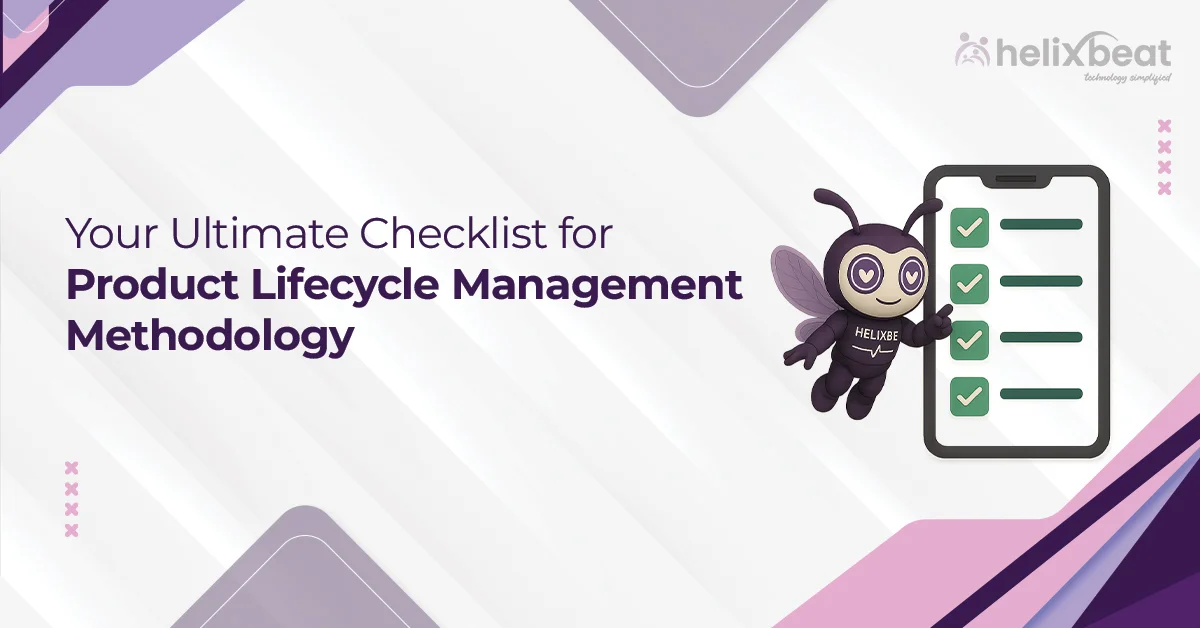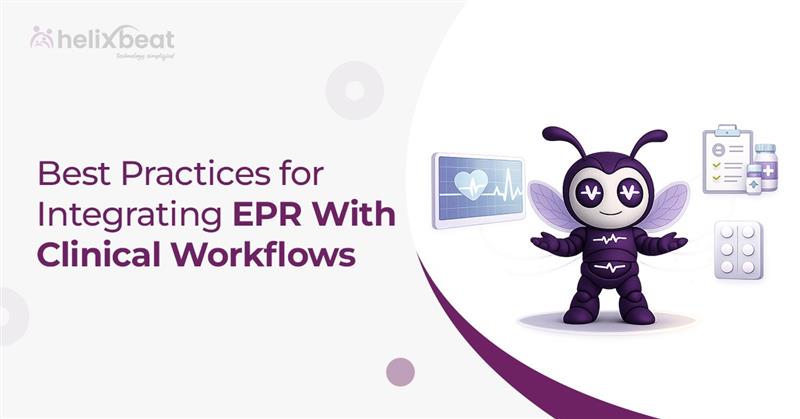AI is everywhere, making our lives easier. Think about how Siri or Alexa instantly responds when you ask a question; they’re using AI to understand you and give you answers. Businesses are also catching on, using AI to save time, cut costs, and provide better services.
When it comes to app development, AI really performs well. Developers without using AI would spend months checking every line of code and fixing bugs. But with AI, this process speeds up. AI tools can automatically test, optimize, and debug the code, getting apps ready faster and with fewer mistakes.
For businesses today, AI in app development is a powerful advantage. In this blog, we’ll explain how Helixbeat uses AI to improve app delivery speed and quality.

Table of Contents
What is the Role of AI in App Development?
Artificial Intelligence (AI) is reshaping software development by automating routine tasks, enhancing code quality, and accelerating delivery timelines. Here’s how AI is making actual progress:
Code Generation
AI tools like GitHub Copilot are now helping developers write code faster by suggesting code snippets or even entire functions based on simple prompts. In fact, GitHub Copilot has been shown to speed up development by 55%, allowing developers to focus more on the creative side of things. Imagine a tool that helps you write your code just like a pair of extra hands.
Microsoft even shared that up to 30% of its code is now generated by AI, which tells you just how much time AI can save developers.
Bug Detection and Debugging
We’ve all been there, spending hours trying to track down a bug in our code. What if AI could do that for you? Tools like DeepCode and Snyk are powered by AI to check code in real time, spot vulnerabilities, and even suggest fixes. This means developers can catch bugs early, making apps safer and more reliable from the get-go.
Automated Testing
Testing can be a major bottleneck in app development, but AI is stepping in to help. With AI-driven testing tools, developers can automatically run test scenarios, detect bugs, and get real-time feedback without doing everything manually.
This not only speeds up the testing process but also catches issues that might otherwise slip through the cracks, ensuring a smoother, bug-free app launch.
Predictive Maintenance
Have you ever wished you could predict when something will go wrong? With AI, this is now possible in software. AI analyzes historical data and predicts when a system might fail, allowing developers to fix potential issues before they become big problems.
Companies like Siemens use this kind of AI in their machinery to predict breakdowns and reduce downtime by up to 25%. Now imagine that everything is running smoothly all the time in your software.
4 Main Challenges of Using AI for App Development
AI can do some pretty amazing things when it comes to app development, but it’s not without its challenges. If you’re thinking about integrating AI in mobile app development, here are four key problems you might face.
1. Data Dependency
AI needs a large amount of data. And not just any data, but high-quality, relevant data. Without it, the AI might not work as expected.
In 2023, over 328 million terabytes of data were created daily, but gathering, cleaning, and preparing this data for AI models is time-consuming and expensive. Developers need to ensure they have relevant, high-quality data to train their AI models effectively.
2. Integration with Existing Systems
Let’s say you already have an app or software system in place, and now you want to add AI to make things smarter. Sounds great, right? Well, it’s not always that easy. Integrating AI into existing systems can be tricky, especially if your infrastructure wasn’t built with AI in mind.
You might find that your current setup needs some serious upgrades, and that can mean extra time and money. It’s kind of like trying to fit a square peg into a round hole; you need to do some work to make it all fit together smoothly.
3. High Cost of AI Development
AI sounds exciting, but it can get expensive. Hiring AI experts, buying the right tools, and maintaining your AI systems can quickly add up. Plus, training AI models with real-time data requires a lot of computational power, which can increase costs even further.
If you’re a startup or working with a tight budget, the financial side of AI can be a big hurdle to overcome. But, of course, the payoff can be huge if you can make it work.
4. Lack of Skilled Talent
AI is a specialized field, and finding the right talent to bring it to life can be tough. You need developers who understand machine learning, data science, and how to build algorithms that work with real-time data.
According to IBM, AI spending is expected to surpass $550 billion by 2024, yet a significant 50% talent gap remains, with companies struggling to find skilled AI professionals.
What Requires You to Build Powerful AI Apps?
Here are the key components needed to build successful AI-powered apps:
- High-Quality Data: AI thrives on large, clean, and relevant datasets. Without quality data, AI models won’t perform well, making data collection and management crucial.
- Strong Machine Learning Algorithms: Choosing the right machine learning algorithms is essential for processing data and making accurate predictions, whether it’s deep learning or simpler models like decision trees.
- Skilled AI Professionals: Building AI apps requires a team of experts—AI engineers, data scientists, and software developers—to design, implement, and optimize the AI models for your application.
- Scalable Infrastructure: AI applications require powerful computing resources. Scalable infrastructure, like cloud platforms, ensures your app can handle growing data and user demands without performance issues.
How Helixbeat Leverages AI in App Development
At Helixbeat, we use AI in app development to transform how we build and deliver applications.
From automating code generation to real-time bug detection, AI speeds up the development process, reduces human error, and improves overall app quality.
With tools like GitHub Copilot for code generation and AI-powered testing platforms for performance checks, we make sure that our apps are faster to build and more reliable. With AI, we understand user behaviour, which enables us to personalize features and optimize the user experience.
By monitoring apps and analyzing data patterns, we at Helixbeat solve the major issues before they affect users. This integration of AI in app development helps us to deliver high-quality, efficient, and user-focused applications within a short time.
What will the future of app development be with AI copilots?
The future of app development is all about working smarter, not harder with AI Copilots. These AI assistants are already helping developers by handling repetitive tasks like generating code, finding bugs, and testing.
As they get better, they will perform more responsibilities, such as suggesting features based on user needs or automatically optimizing app performance. This means developers can focus more on creativity and solving big problems while the AI takes care of other things.
Looking ahead, AI Copilots will make app development faster, cheaper, and more personalized. They will learn from user behaviour, making apps smarter and more responsive over time.
The result? Developers will have a powerful partner in AI, working together to create better apps that keep users happy. With AI Copilots, the future of app development will be all about speed, quality, and innovation.
Why Choose Helixbeat for Web Development Services
What makes Helixbeat stand out is our focus on collaboration with you. We take the time to understand your goals, challenges, and business objectives, ensuring that the solutions we create are not only technically sound but also aligned with your broader vision. By integrating AI into app development, we ensure that your web applications are smarter, more efficient, and have a high user experience.
But our commitment doesn’t stop at development. At Helixbeat, we provide ongoing support and maintenance to keep your website running smoothly. From regular updates to security audits and performance optimizations, we ensure your website stays secure and fully functional long after launch.
When you choose Helixbeat, you’re teaming up with a dedicated group focused on delivering responsive, user-friendly, and forward-thinking web development solutions tailored to your needs.
FAQ:
1. Is AI Used in App Development?
Yes, AI is widely used in app development to automate tasks, enhance functionality, and improve user experiences, such as code generation, bug detection, and user behaviour prediction.
2. What is the Future of AI in App Development?
AI will make app development faster, smarter, and more efficient by automating tasks like debugging and testing, predicting user needs, and personalizing experiences in real time.
3. Will AI Take Over Mobile App Development?
AI will assist in development but won’t fully replace developers. It will automate repetitive tasks while developers focus on creativity, problem-solving, and strategy.
4. Can ChatGPT Build an App?
ChatGPT can assist by generating code, providing solutions, and answering questions, but it cannot build an entire app. It’s a helpful tool, not a replacement for developers.
5. How Is AI Used in Mobile Apps?
AI in mobile apps is used for personalization, such as tailoring content and recommendations, like Netflix. It also powers natural language processing for voice assistants like Siri, enables image recognition to identify objects or faces in photos, and provides predictive analytics to anticipate user actions and enhance the overall experience.
6. What is the Best AI for App Development?
Some of the best AI tools for app development include TensorFlow for machine learning models, IBM Watson for natural language processing and visual recognition, OpenAI GPT for creating chatbots and text-based apps, and Microsoft Azure AI, which offers a wide range of cognitive services for developers.













